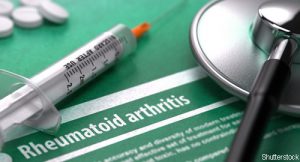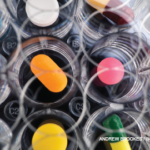 EULAR 2022 (VIRTUAL)—Østergaard et al. compared the radiographic and clinical outcomes of active conventional therapy for patients with rheumatoid arthritis (RA) with the outcomes of patients with RA treated with three biologic therapies with different mechanisms of action. Mikkel Østergaard, MD, Rigshospitalet, Center for Rheumatology and Spine Diseases, Glostrup, Denmark, presented the results of this open-label, blind-assessor study during the 2022 Congress of the European Alliance of Associations for Rheumatology (EULAR).1
EULAR 2022 (VIRTUAL)—Østergaard et al. compared the radiographic and clinical outcomes of active conventional therapy for patients with rheumatoid arthritis (RA) with the outcomes of patients with RA treated with three biologic therapies with different mechanisms of action. Mikkel Østergaard, MD, Rigshospitalet, Center for Rheumatology and Spine Diseases, Glostrup, Denmark, presented the results of this open-label, blind-assessor study during the 2022 Congress of the European Alliance of Associations for Rheumatology (EULAR).1
To be enrolled in the study (NCT01491815), adult patients had to have treatment-naïve early RA with a symptom duration of less than 24 months and a Disease Activity Score-28 (DAS-28) for RA with C-reactive protein (CRP) of >3.2. Patients also had to have a minimum of two swollen and tender joints, as well as at least one of the following: positivity for rheumatoid factor (RF) or anti-citrullinated protein antibodies (ACPA), and/or a CRP level of >10 mg/L.2
The researchers randomized 812 patients, mostly women, with a mean age of 55 years in a 1:1:1:1 ratio to receive 25 mg of methotrexate weekly combined with one of four treatment regimens:
- 20 mg of oral prednisolone daily tapered over nine weeks to 5 mg daily, then discontinued at week 36; or 2 g of sulfasalazine daily; or 35 mg/kg of hydroxychloroquine weekly; and mandatory intra-articular glucocorticoid injections in swollen joints (active conventional therapy);
- 200 mg of subcutaneous certolizumab pegol administered every other week;
- 125 mg of subcutaneous abatacept administered every week; or
- tocilizumab administered as four weekly infusions of 8 mg/kg of bodyweight or 162 mg given as a subcutaneous solution weekly.
The primary study outcomes at week 48 were the proportion of patients in remission according to the Clinical Disease Activity Index (CDAI ≤2.8) and a change in the radiographic progression in the total van der Heijde-modified Sharp Score from baseline. The primary end points were estimated using logistic regression and analysis of covariance, adjusted for sex, ACPA status and the country where patients live.
Results: The adjusted CDAI remission rates at week 48 for each group were:
- 3% for abatacept;
- 3% for certolizumab pegol;
- 9% for tocilizumab; and
- 2% for active conventional therapy.
Because two primary outcomes were examined, significance was defined as a P value ≤0.25. For the CDAI remission rates of the biologic agents, abatacept (P<0.001) and certolizumab pegol (P=0.021) were superior to active conventional therapy. For CDAI remission rates, the difference in remission rates for tocilizumab did not achieve formal statistical significance (P=0.030). The adjusted mean change in the total modified Sharp-van der Heijde score from baseline was low, indicating no significant differences between the four treatments related to radiographic progression.
Key secondary clinical outcomes were consistently better in the biologic treatment groups. These outcomes included: CDAI remission at week 24, DAS-28 remission at weeks 12 and 24, and EULAR Good Response. Key secondary outcomes demonstrated no major differences among the four treatments.
Serious adverse events, which were not delineated in the abstract, occurred in each treatment group: 28 in the certolizumab pegol group, 23 in the active conventional therapy group, 32 in the abatacept group and 20 in the tocilizumab group. No new safety signals were reported during the study.
This study showed that in untreated patients with early RA, CDAI remission rates for abatacept and certolizumab pegol were superior to active conventional treatment. Radiographic progression was low and similar among all treatments evaluated.
Michele B. Kaufman, PharmD, BCGP, is a freelance medical writer based in New York City and a pharmacist at New York Presbyterian Lower Manhattan Hospital.
References
- Østergaard M, Van Vollenhoven R, Rudin A, et al. Certolizumab-pegol, abatacept, tocilizumab or active conventional therapy in early rheumatoid arthritis: Clinical and radiographic 48-weeks results of the investigator-initiated randomized NORD-star trial [OP0058]. Ann Rheum Dis. 2022; 81(suppl 1):38–40.
- Active conventional therapy compared to three different biologic treatments in early rheumatoid arthritis with subsequent dose reduction [NCT01491815]. ClinicalTrials.gov. 2021 Jul 27.


